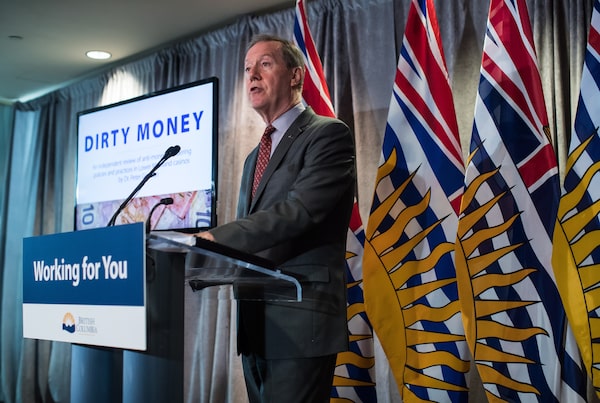
Peter German, former deputy commissioner of the RCMP, speaks about his review of anti-money laundering practices in the province, during a news conference in Vancouver on June 27, 2018.DARRYL DYCK/The Canadian Press
A new probe into money-laundering in British Columbia will look into private lenders' use of Vancouver-area real estate to hide drug money, a tactic uncovered in a Globe and Mail investigation.
Peter German, a former deputy commissioner of the RCMP and Correctional Service Canada, is heading the review for Attorney-General David Eby.
The scope of the review includes real estate, horse racing and luxury cars.
In his terms of reference, Mr. German has been directed to look at abuse of the builders’ liens system, where a lien is registered against a property for a criminal purpose – to launder money or to enforce a loan-shark transaction.
Mr. Eby told reporters at a news conference on Thursday that media accounts of money laundering helped determine the direction of this new investigation. The terms of reference were released on Friday.
“The important work done by Kathy Tomlinson at the Globe and Mail raised deeply troubling issues related to the use of builder’s liens by individuals alleged to be involved in serious criminal activities. I have asked Mr. German to take those reports and look specifically at this issue in detail,” Mr. Eby said in a statement.
Mr. German is to look at “alleged issues of criminal activity and money laundering relating to real estate to determine the scale and scope of any actual problem.”
In addition to the use of builders’ liens, he will look for evidence that lawyers’ trust accounts have been used to avoid scrutiny of the source of funds in real estate transactions, and the use of the industrial or residential construction industry as a means of laundering money.
Earlier this year, an investigation by The Globe and Mail revealed that people connected to the deadly fentanyl trade are parking their illicit gains in Vancouver-area real estate market through private lending schemes.
The individuals providing these loans are unlicensed and unregulated, providing cash to home buyers. They can then force collection of their debts by filing a builders’ lien against a house. The lien is a simple, one-page form, designed to be used by actual builders who have not been paid. The lien gives its holder an immediate legal stake in the real estate – without the owners having to be informed. A builders’ lien is easier to register than a mortgage, to which a borrower must agree.
In June, the government released an earlier report by Mr. German on money laundering in B.C. casinos. Mr. German found that the province’s dysfunctional regulatory regime for casinos has enabled large-scale transnational money laundering by organized crime that is tied to the trade in opioids.
In that report, Mr. German warned that the so-called Vancouver model of money laundering, which took advantage of a quarrel among agencies that hindered oversight, threatens to seep into other sectors of the economy.
Mr. Eby said he is concerned that the measures his government has taken to combat money-laundering in casinos will simply push criminals into other sectors of the economy.
 Justine Hunter
Justine Hunter